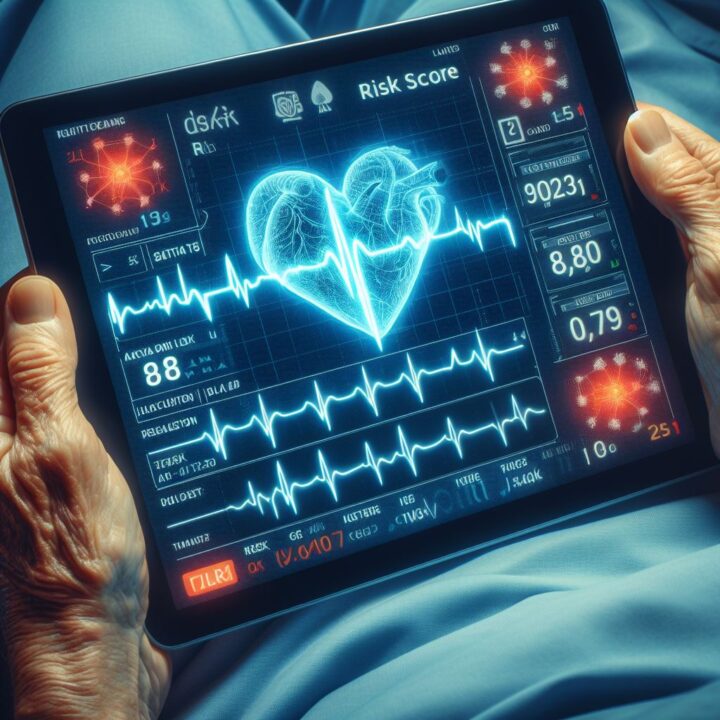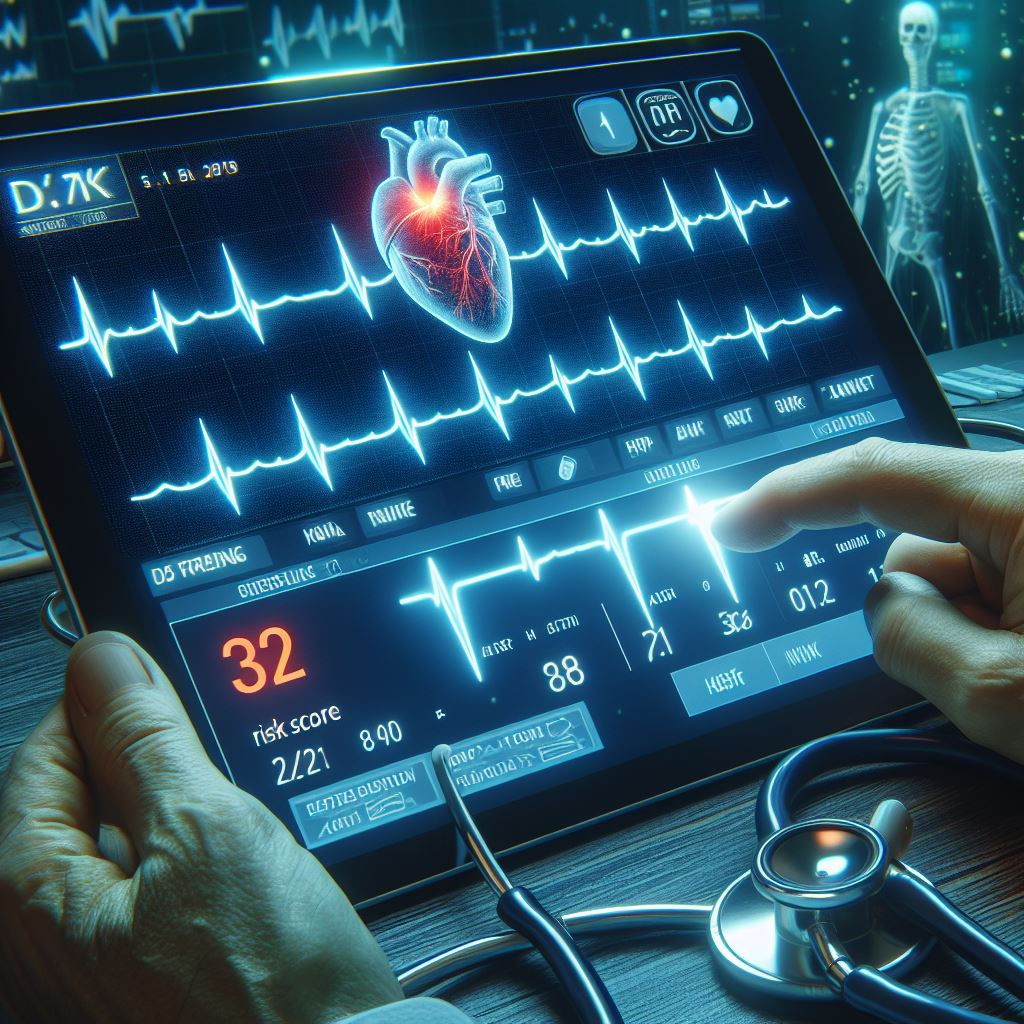A team of researchers at MIT has developed an AI algorithm that can analyze electrocardiogram (EKG) readings and predict the risk of heart attacks with 90% accuracy. The algorithm, dubbed RiskCardio, uses deep learning to identify subtle patterns in the EKG signals that indicate the health of the heart muscle.
EKG is a common and non-invasive test that measures the electrical activity of the heart. It can detect various heart conditions, such as arrhythmias, coronary artery disease, and heart failure. However, conventional EKG analysis relies on human interpretation and can miss some signs of cardiac damage or dysfunction.

Table of Contents
RiskCardio aims to overcome this limitation by using a large dataset of EKG recordings from patients who had experienced a heart attack within the past 72 hours. The algorithm learns to associate the EKG features with the severity of the heart attack and the likelihood of future cardiac events. The algorithm can then apply this knowledge to new EKG readings and provide a risk score for the patient.

The researchers tested RiskCardio on a separate dataset of EKG recordings from patients who had visited the emergency department with chest pain. They found that the algorithm could accurately predict the risk of heart attacks within 30 days, 90 days, and one year, outperforming existing methods and clinical guidelines.
The researchers hope that RiskCardio can help doctors and patients make better decisions about the diagnosis and treatment of heart conditions, as well as prevent unnecessary hospitalizations and interventions. They also plan to extend the algorithm to other types of cardiac data, such as echocardiograms and blood tests.

“RiskCardio is a powerful and simple tool that can provide a personalized and precise assessment of the cardiac risk based on EKG data,” said Dr. Divya Shanmugam, the lead author of the paper and a postdoctoral researcher at MIT. “We believe that this can have a significant impact on improving the quality and efficiency of cardiac care.”
The Foundation: Understanding EKG
Before delving into RiskCardio’s capabilities, it’s crucial to grasp the significance of EKG in assessing cardiac health. EKG serves as a vital tool for detecting various heart conditions, including arrhythmias, coronary artery disease, and heart failure. However, its reliance on human interpretation can lead to oversight, making it imperative to explore alternative methods like RiskCardio.
The Genesis of RiskCardio
RiskCardio’s development stemmed from a comprehensive dataset comprising EKG recordings from patients who had experienced a heart attack within the past 72 hours. By associating EKG features with the severity of heart attacks and the likelihood of future cardiac events, the algorithm learned to provide a risk score for patients undergoing new EKG readings.
Outperforming Conventional Methods

MIT researchers put RiskCardio to the test by analyzing a separate dataset of EKG recordings from patients with chest pain visiting the emergency department. The results were astonishing, as the algorithm outperformed existing methods and clinical guidelines in predicting the risk of heart attacks within 30 days, 90 days, and one year.
Implications for Diagnosis and Treatment

The potential impact of RiskCardio extends beyond accurate predictions. The researchers envision its role in aiding doctors and patients in making informed decisions about the diagnosis and treatment of heart conditions. Furthermore, the algorithm has the potential to prevent unnecessary hospitalizations and interventions, optimizing the efficiency and quality of cardiac care.
Dr. Divya Shanmugam’s Insight

Dr. Divya Shanmugam, the lead author of the paper and a postdoctoral researcher at MIT, emphasizes RiskCardio’s simplicity and power as a tool for personalized and precise assessment based on EKG data. The belief is that this innovation can significantly enhance the overall quality of cardiac care.
Future Prospects
Looking ahead, MIT researchers plan to expand RiskCardio’s capabilities beyond EKG data. The goal is to integrate other types of cardiac data, such as echocardiograms and blood tests, into the algorithm. This expansion could potentially broaden the applications of RiskCardio in comprehensive cardiac care.
Summary
| Topic | Key Points |
|---|---|
| Introduction | MIT’s RiskCardio achieves 90% accuracy in predicting heart attacks. |
| Understanding EKG | EKG is a crucial tool for detecting various heart conditions, but human interpretation has limitations. |
| Genesis of RiskCardio | Developed from a dataset of EKG recordings from recent heart attack patients. |
| Outperforming Conventional Methods | RiskCardio excels in predicting heart attack risks within specific time frames. |
| Implications for Diagnosis and Treatment | RiskCardio aids doctors and patients in making informed decisions about cardiac care. |
| Dr. Divya Shanmugam’s Insight | Lead author highlights RiskCardio’s simplicity and power in personalized risk assessment. |
| Future Prospects | MIT plans to expand RiskCardio to integrate other cardiac data for comprehensive care. |
| Conclusion | RiskCardio represents a transformative step in the accurate prediction of heart attacks. |
FAQ
1. How does RiskCardio achieve a 90% accuracy rate in predicting heart attacks?
RiskCardio utilizes deep learning to analyze EKG readings, identifying subtle patterns associated with the severity of heart attacks. This enables the algorithm to provide a precise risk score for patients.
2. What distinguishes RiskCardio from traditional EKG analysis?
Unlike traditional EKG analysis, which relies on human interpretation, RiskCardio leverages AI to identify intricate patterns in EKG signals, minimizing the risk of oversight and improving accuracy.
3. What types of heart conditions can EKG detect?
EKG is capable of detecting various heart conditions, including arrhythmias, coronary artery disease, and heart failure, making it a versatile diagnostic tool.
4. How was RiskCardio tested, and what were the results?
RiskCardio underwent testing on a dataset of EKG recordings from patients with chest pain visiting the emergency department. The algorithm outperformed existing methods in predicting heart attack risks within specific time frames.
5. How can RiskCardio benefit doctors and patients?
RiskCardio has the potential to assist doctors and patients in making informed decisions about the diagnosis and treatment of heart conditions, optimizing the efficiency and quality of cardiac care.
6. What are the future prospects for RiskCardio?
MIT researchers plan to expand RiskCardio’s capabilities by integrating other types of cardiac data, such as echocardiograms and blood tests, into the algorithm, enhancing its applications in comprehensive cardiac care.
7. What role does Dr. Divya Shanmugam play in the development of RiskCardio?
Dr. Divya Shanmugam is the lead author of the paper and a postdoctoral researcher at MIT. She highlights RiskCardio’s simplicity and power as a tool for personalized and precise assessment based on EKG data.
Conclusion
MIT’s RiskCardio represents a significant leap forward in the accurate prediction of heart attacks, showcasing the potential of AI in transforming cardiac care. As we continue to explore the intricacies of this groundbreaking algorithm, its implications for the medical field are vast, promising a future where cardiac conditions can be detected and managed with unprecedented precision.
: MIT researchers develop AI that can predict heart attacks with 90% accuracy
: MIT Computer Science and Artificial Intelligence Laboratory



